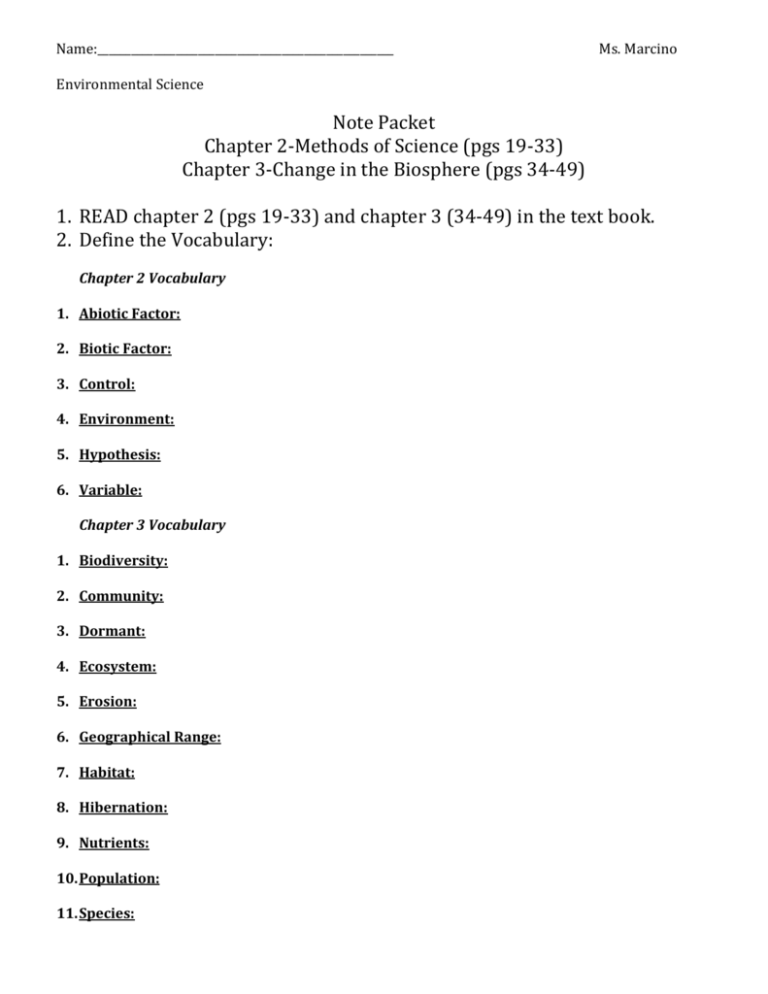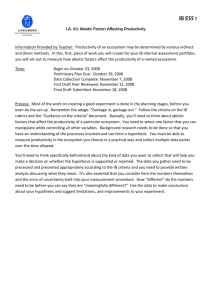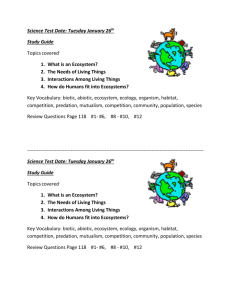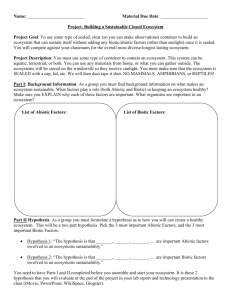Chapter 2 – Methods of Science
advertisement

Name:_____________________________________________________ Ms. Marcino Environmental Science Note Packet Chapter 2-Methods of Science (pgs 19-33) Chapter 3-Change in the Biosphere (pgs 34-49) 1. READ chapter 2 (pgs 19-33) and chapter 3 (34-49) in the text book. 2. Define the Vocabulary: Chapter 2 Vocabulary 1. Abiotic Factor: 2. Biotic Factor: 3. Control: 4. Environment: 5. Hypothesis: 6. Variable: Chapter 3 Vocabulary 1. Biodiversity: 2. Community: 3. Dormant: 4. Ecosystem: 5. Erosion: 6. Geographical Range: 7. Habitat: 8. Hibernation: 9. Nutrients: 10. Population: 11. Species: 12. Tectonic Plate: 13. Territory: 14. Weathering: Chapter 2 – Methods of Science Scientific MethodOHEC 1. 2. 3. 4. OBSERVATION Information we __________________________________________________________________________. Scientists “observe” problems they want to ___________________ or ____________________ ________________________________________________________. They make as many observations as they can about the subject. HYPOTHESIS Is a _______________________________________________________________ for a set of observations, written as an ___________________________________________________________. A hypothesis can be ________________________________. A hypothesis is fluid, it must _________________ as new _______________________________ is gathered. Check for Understanding: 1.Explain why a hypothesis is not just a wild guess. 2. Why are scientific ideas uncertain by nature? 3. The United States government has established recommended daily allowances for many nutrients. The amounts recommended for some nutrients have changed over the years. Why do you think this has happened? EXPERIMENT A ___________________________ designed to _________________________________________________ under ___________________________________________________. Multiple experiments by multiple scientists are needed to __________________________ _____________________________________________________________________. DESIGNING AN EXPERIMENT Variable Control Significant Number Data Analysis- CONCLUSION Did we ________________________ or ________________________ the hypothesis? What we _______________________________________________________________________________. A similar result from ___________________________________________________________________ is correct. _________________________________________ can cause a hypothesis to change. SCIENTIFIC METHOD (OHEC) O H E C Check for Understanding: 1. How does an experimental setup differ from a control setup? 2. Why should a scientist conduct research before beginning an experiment? 3. One of the most important skills a scientist can have is the ability to write well. Why do you think this is so? SCIENCE AND ETHICS Progress in science is driven by ________________________________________________________. Products of scientific research can be both beneficial and harmful. ENIVRONMENTAL SCIENCE Environment Environment provides _______________, _______________, ____________________, _____________ and other resources. Abiotic factors Biotic factors Environmental science is the study of Check for Understanding: 1. What is meant by the word “environment”? 2. Which parts of the environment respond to the activities of organisms, the biotic factors or the abiotic factors? Chapter 3-Change in the Biosphere THE CHANGING ENVIRONMENT The lithosphere is made of several large moveable _______________________________________________. Molten rock ___________________________________________________________________________________________. The ________________________________________ hardens (as it cools) pushing apart the plates ___________________________________________________________. ______________________________________________ form when the plates cause the Earth’s surface to buckle. EARTHQUAKES Vibrations cause by ____________________________________________________________________________ (break in the Earth’s crust). ______________________________________________ (9.5 is the most powerful to ever be recorded). Most earthquakes take place on or near ________________________________________. VOLCANOES A ______________________________________________________________________ (melted rock) that rises from the Earth’s interior to its ______________________________. Often located near ____________________________________________________________________. On ____________________________________________. o “______________________________________________” contains 75% of world’s _________________________ volcanoes that are on land. OTHER LITHOSPHERE CHANGES Weathering- Erosion- CHANGES IN THE HYDROSPHERE ICE AGES EL NINO A long period of cooling, Beginning in December, a Huge masses of ice El Nino can have Evidence of 5 ice ages in the CHANGES IN THE ATMOSPHERE Early Earth’s atmosphere was mostly ______________________________________, _______________________________, and ____________________________ from volcanic eruptions. __________________________________________ released first ______________________________ into atmosphere. For the past _________________________________________________, the atmosphere consists of recycled __________________________________, __________________________________, ______________________________________, and _______________________________________. Greenhouse Effect- Check for Understanding: 1. Through what process does weather affect the shape of land? 2. In what ways does El Nino affect the economy? NEEDS OF ORGANISMS Water- Food and Energy- o Nutrients Living Space- Climate- Climate produces varied ____________________________________________________. Range of Tolerance- Dormant- Hibernation- Hamsters, prairie dogs, dormouse, bats, fat tailed lemurs, ground squirrels, lizards, snails, snakes, earthworms, ladybug, mosquitos. Check for Understanding: —1. In what ways does the behavior among territorial animals differ? —2. How does hibernation help animals to survive? —3. Do you think that the amount of water used by each person in the United States has changed over time? If so, in what way? Explain your answer. THE ECOSYSTEM Ecosystem is a ____________________________________________, structured environment that is ______________________________________________. Ecosystems can be studied on many levels, from _______________________________________________________ ________________________________________________________________________________. Includes all the __________________________________________________________________________________________. ECO-VOCABULARY Species- Habitat- Geographical Range- Populations- Community- Ecosystem- Biodiversity- Check for Understanding: —1. What factors are included in an ecosystem? —2. What do you think is the geographical range for human beings?











